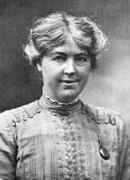Person: Macmillan (2), Chrystal

Chrystal Macmillan was the first female science graduate at Edinburgh University and the first female honours graduate in Mathematics. She became active in the Women's Suffrage Movement and went on to become a lawyer.
Mathematical Profile (Excerpt):
- Macmillan then returned to Edinburgh and began her studies at Edinburgh University first matriculating in October 1892.
- Macmillan studied Mathematics with Chrystal and Natural Philosophy with Tait in session 1892-93.
- In session 1893-94 she took Chemistry and Practical Chemistry with Drinkwater in the School of Medicine, Intermediate Honours Mathematics with Chrystal and Intermediate Honours Natural Philosophy with Knott.
- In the following academic year 1894-95 she studied Advanced Honours Mathematics with Chrystal, Astronomy and Practical Astronomy with Copeland, then in 1895-96 Advanced Natural Philosophy with Tait.
- After studying at the University of Berlin over the summer of 1896, Macmillan returned to Edinburgh and matriculated in the Faculty of Arts in October 1896 after passing the Preliminary Examination in Greek.
- After graduating Macmillan worked for the Scottish Federation of Women's Suffrage Societies, campaigning for women's rights to vote.
- The General Councils consisted of the graduates of the four universities, and now Macmillan and many other women were graduates.
- She, along with other women, argued that women graduates were 'persons' and therefore allowed to vote in electing the university MPs. As honorary secretary of the Women Graduates of the Scottish Universities (Parliamentary Franchise) Committee, Macmillan brought a court action in 1906 to argue that women graduates had the right to vote as 'persons' on the General Councils.
- Two days later the hearing was resumed and Miss Macmillan, dressed this time in a dark red costume and hat, with ermine furs, spoke for three hours with complete self-possession and great skill in exposition.
- The case was rejected and Macmillan moved to London to carry on the fight for women's rights to vote.
- When war broke out in 1914 Macmillan, who strongly opposed the war, resigned from the National Union of Women's Suffrage Societies because of the position it took.
- The conference was held in April 1915, with Macmillan one of only three British women able to attend since the North Sea was by that time closed.
- After the war ended in 1918, Macmillan was a delegate at the International Congress of Women in Zürich in May 1919 which issued a strong condemnation of the harsh terms imposed on Germany by the Treaty of Versailles.
- Looking back on these events with the benefit of hindsight, we can now say that Macmillan's views have been shown to have been right.
- Macmillan was now able to join the legal profession, which had been opened to women, and felt that from this position she would be better able to advance the causes in which she believed.
- Macmillan joined the Edinburgh Mathematical Society in May 1897 when she was reading for her M.A. at Edinburgh.
- Macmillan remained a member of the Society until 1915.
- Macmillan received much recognition for her achievements.
- A fund was set up at Livingston House, Broadway, London, to provide an annual Chrystal Macmillan Prize for women students of Law and to support the societies with whose work she was particularly associated.
- The Millennial Plaque at King's Buildings erected in her honour uses her full name, Jessie Chrystal Macmillan but throughout her professional life she was invariably known as Chrystal Macmillan and the School wishes to name its refurbished building 'The Chrystal Macmillan Building'.
Born 13 June 1872, Edinburgh, Scotland. Died 21 September 1937, Edinburgh, Scotland.
View full biography at MacTutor
Tags relevant for this person:
Origin Scotland, Women
Thank you to the contributors under CC BY-SA 4.0! 

- Github:
-

- non-Github:
- @J-J-O'Connor
- @E-F-Robertson
References
Adapted from other CC BY-SA 4.0 Sources:
- O’Connor, John J; Robertson, Edmund F: MacTutor History of Mathematics Archive
